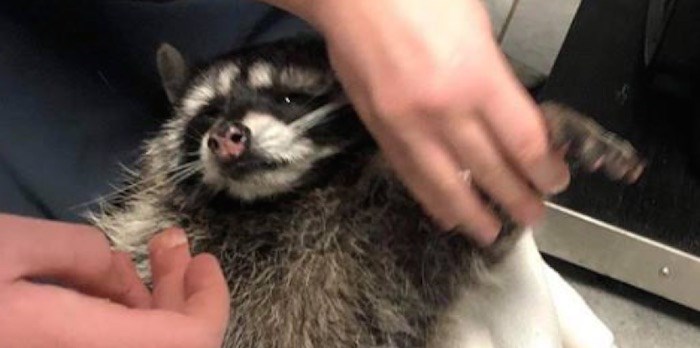 This raccoon was caught in a live trap and then place in a garbage can full of water to drown. Photograph By CRITTER CARE WILDLIFE SOCIETY
This raccoon was caught in a live trap and then place in a garbage can full of water to drown. Photograph By CRITTER CARE WILDLIFE SOCIETY
The BC SPCA is investigating the death of a racoon that was caught in a live trap and placed in a garbage bin full of water for more than a week.
Senior Const. Eileen Drever said her team is awaiting the results of a necropsy to determine the animal’s cause of death. The SPCA will conduct a thorough investigation before determining whether to recommend animal cruelty charges to Crown lawyers, she said.
Drever explained Canadian animal cruelty laws generally don’t apply to wild animals but because the racoon had been trapped, it is considered to have been in captivity.
Earlier this week, staff at Critter Care Wildlife Society ‒ which provides care and rehabilitation to mammal species native to B.C ‒ said they were shaken up after dealing with the “extremely inhumane” case.
Animal care supervisor Brooklynn Martin said staff were called to a property in Burnaby on Friday about 1 p.m. after the young adult female raccoon had been found by a tenant in the garbage can barely alive.
Martin said it was believed the landlord of the property had set the trap about a week and a half before and the tenant had assumed the raccoon had been released.
“It turns out that the raccoon was left in the trap and he put it in a garbage can and filled it with water and left the trap there,” she said.
“As soon as the tenant found out what happened he called us immediately and was very frantic asking what he could do in the meantime before we got there.”
The tenant took the raccoon out of the trap, dried her off and placed hot water bottles around her to keep her warm until staff arrived.
“It was a full-grown adult raccoon and it was so weak and so mentally gone that the tenant and my staff were just handling it without gloves,” Martin said.
Martin said it was by-far one of the worst cases of animal cruelty she had come across in her three years working at the wildlife society.
“This raccoon was stuck in a trap with no food and basically being forced underwater with no way to get out,” she said.
“She came in and her nose was all scratched up, all her nails on her paws had been ripped out, her paws were raw she had been trying so hard to get out and there was basically no hair left on her tail.
“Each cruelty case is bad and you deal with the situation and it makes you sad but this one, in my opinion, is probably the worst that I have had to deal with.”
She said it was common for people to set live traps for problem critters and it wasn’t illegal if it was done in a humane manner.
“If you don’t want them on your property you have a 10km radius around your house where you can trap them and then you can relocate the animal somewhere else,” Martin explained.
“But legally you are not allowed to set a trap and leave whatever is in there for longer than 24 hours and this poor raccoon was in a trap for over a week.
“We have dealt with a lot of cruelty cases, mainly leg hold traps, and they maim the animal and cause them pain.
“But physically torturing the animal and trying to drown it - it got to all of us at the centre, all the staff were pretty shaken up about it.
“The way this live trap was used was extremely cruel and extremely inhumane.”



